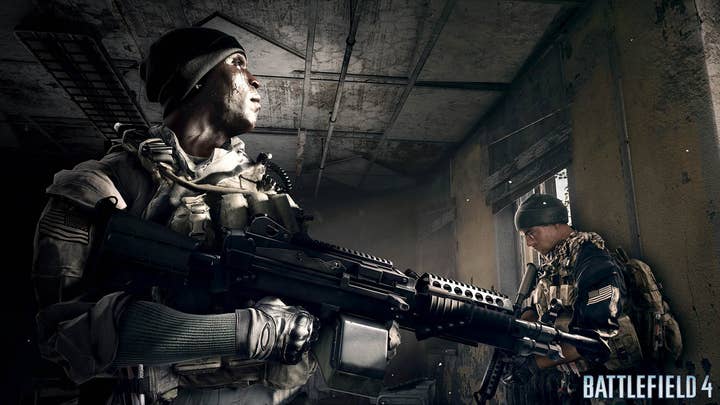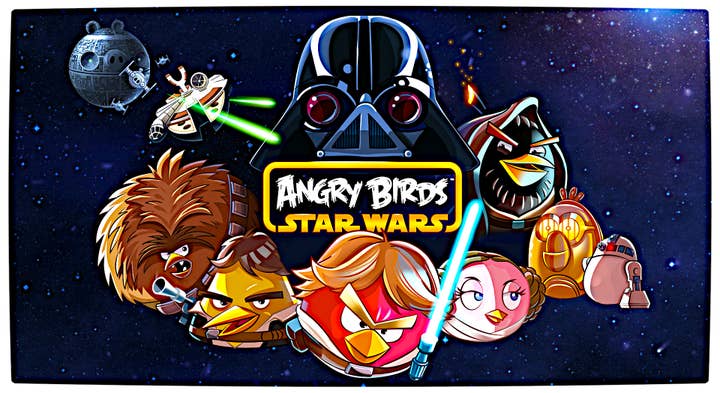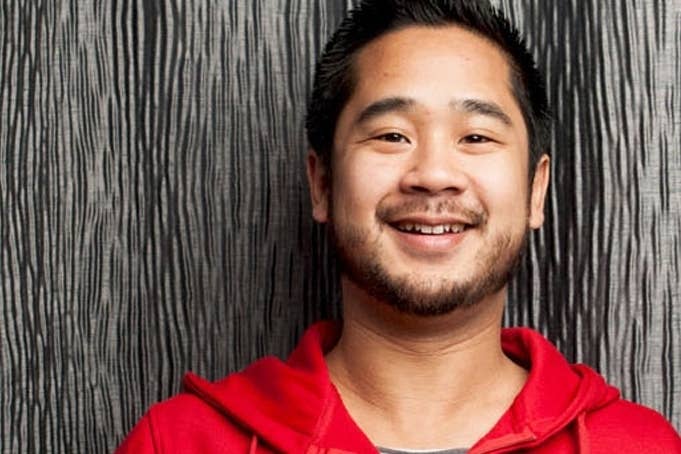Patrick Liu: "We could kill the industry if we don't get more inclusive"
Rovio Stockholm's creative director talks Battlefield, Birds and bad attitudes
The job of creative director at a new studio is pretty much the industry dream gig. Add to that the bonus that it's owned by the biggest name in the fastest growing market and run by an old friend and you'd be a fool to walk away. For Patrick Liu, leaving his previous home of Dice wasn't easy, but knowing that he could take on a new challenge in a studio where he'd have major input on staffing and almost complete control of the creative output certainly helped to make his mind up.
Obviously, there's a big shift in what he'll be working on, despite that creative freedom. He tells me that he "probably won't be making too many military shooters," with a quick grin, but he's clearly thrilled with the move. With Dice having shed a few high-profile members in the last few months, including Battlefield 3 lead David Goldfarb, I ask Patrick if there's been an exodus from the EA-owned studio, or if it's just market forces at work.
"I think some guys moved to other AAA studios like 343 or Bungie, so I think it was just coincidence that so many people moved to other places at that particular time. I think also these things happen all the time. Projects change, roadmaps change - it was probably just a good time for people to be leaving."
Presumably a lot of people ended up with a chance to take a fresh perspective once work had been completed on the DLC for Battlefield 3, then?
"EA has openly pursued digital for a very long time now but I kind of felt that I wanted to get there more quickly"
"Yeah, exactly," he replies. "For me specifically, I need to keep on top at all times, to try and do something fresh and new. In a way it was EA that taught me that. EA has openly pursued digital for a very long time now but I kind of felt that I wanted to get there more quickly. Rovio is a purely digital company - there are no packaged goods at all if you don't count the toys, basically. So I wanted to kickstart that, work with something fresh.
"So the opportunity to open a new studio was amazing, of course - it's a unique opportunity that you just can't say no to."
Especially when an old colleague and friend is going to be your boss. Still, though, Liu's talent is not something you attract with the promise of friendly management and a nice office alone. Was he really given carte blanche to work on whatever he wished?
"Basically, yes! It's the best of both worlds," the friendly Swede tells me. "The first time I heard about it was about this time last year - I remember coming by Rovio's booth at Nordic Game. There was funding, much more say in what I'd be doing. When Oskar (Burman) announced he was leaving I didn't know he was going to Rovio. We'd been friends for some time but we hadn't worked together properly.

"I just had a gut feeling that he was doing something exciting so I said, "let's do this!" He convinced me that we'd have the freedom to do what we wanted. Finns are much closer to Swedes in terms of work ethics, too, so that was a big plus. We still wanted to share the same core values - we wanted to make family friendly games, to get into mobile, all that. So as long as we share that core, we can pretty much do what we want."
That morning we'd both sat in the main hall of the event's venue, listening to Tim Schafer talk about Double Fine's famous Amnesia Fortnight event - the internal brainstorming process which gave rise to a raft of new game ideas and reportedly rescued the company from potential bankruptcy. How does that process compare to what Liu has been doing at Rovio?
"I obviously have some aspirations about how we should work - we're looking at other studios which are very popular amongst developers - Valve or Naughty Dog for example. At this stage we're still exploring what we're doing but it's basically a constant Amnesia Fortnight. That's all we do. We did some work on the last Angry Birds Seasons update, so we do work with that but otherwise it's just having people do what they want. I haven't told anyone: you should be working on this or that. We set up guidelines, so we'll say we want to make a game that's a bit like this, or another one with these rough criteria, then people figure out what project they think they should work on. It's pretty much autonomous.
"At this stage we're still exploring what we're doing but it's basically a constant Amnesia Fortnight"
"At some point we'll have to decide what project we choose to take to market, but we're not at that stage yet."
That luxury of creative freedom which a well-stocked warchest provides is one that few can (literally) afford, and even Rovio must be keen to turn some of these ideas into revenue. Is there a timeframe to getting Stockholm's first game to market? Will they be working on a single project once that target is set?
"We're aiming at working on several projects at one time, but it sort of depends on how big that project becomes. If they're smaller, we can afford to work on several at once, but if one gets bigger then we might focus on that."
Working for Rovio on new IP must be something of a mixed blessing. When your flagship product is a global household name, but your company's is not - how do you go about leveraging your success to promote new games? Although it has obvious advantages, putting your new project into the world under a flashing neon banner saying "from the makers of Angry Birds" surely tarnishes a little of the glint of independence...
"I think you just have to do what you do best and not listen too much to what other people say - just really focus on the next thing," says a thoughtful Liu. "Rovio is very humble about that, I would say. Yes, we're recognised more for Angry Birds and we're probably not going to achieve that massive success again any time soon, so let's invest in something else, things we think we can make the best we can. Both external and internal projects. We're focusing really hard on doing new stuff - we have a mission to do new things, work with new concepts.

"We need to grab the opportunities that we have now and not just stay with Angry Birds forever. I mentioned in my talk that I don't think the slingshot game is going to be around for ever, but I do think that the brand is going to be around for a very long time in new contexts. It's a similar situation to Dice and Battlefield. Battlefield has become bigger than Dice - again, they need to find a way to handle that in case the game is taken away. Obviously Rovio is independent so no-one can take Angry Birds away - we own the IP and there are no other publishers so we're in control of our own destiny."
The company is in a fine balance. With one runaway, transmedia IP and a couple more which are less established but still successful in their own right, isn't it tempting to take the best ideas which bubble to the top of Liu's think-tank and skim them off for the proven winners?
"It's something we think of from day one," Liu admits. "Obviously we want to work with the strengths that Rovio gives us. They have the incredibly strong Angry Birds brand, so if we come up with something that fits perfectly with the brand then we'll use it - it's not like we're not allowed to make them. If we do find a concept that doesn't fit, though, then obviously we make a new brand. One of the things that really attracted me to them was the cool stuff like the cartoons, the animation studio and the toys. Using all that capacity is something I'm really excited about."
Inevitably, the name of Disney comes up not long after we start discussing Rovio's approach to transmedia. Liu is a big fan, and well aware of the parallels. I ask whether Uncle Walt's empire is ever seen internally as a goal to aim at.
"I would say that Disney is a very good aspiration"
"I would say that Disney is a very good aspiration," he grins. "The wide-appeal and reach of their brands is incredible. It's a childhood dream come true to try and create a new Disney."
Rovio is certainly well on its way up that path, with fingers in the pies of cinema, merchandising, books and even F1 sponsorship. That sort of success doesn't go unnoticed and many credit Rovio with turning the heads of the established industry and proving that mobile gaming is quite capable of spawning successful multinationals. In the wake of the recent next-generation console reveals, does Liu feel that Sony and Microsoft are turning their eyes towards the casual market?
"It certainly seems so to me," he asserts. "A question a lot of people asked before the reveal was just that: will they focus more on the core market or widen it to appeal to the mass-market? It seems to me that Xbox One was very mass-market appeal during the conference, we'll see what happens at E3. The offering so far is very mass-market.
"I'm not predicting the death of consoles, as a lot of peers are doing, but I do believe that the growth is happening in other markets. I still think that there's enough demand to see AAA consoles continuing, it's just not going to grow as much. I think the console makers realise that and that's why they're concentrating more on other stuff like TV, so they become more relevant as machines. Mobile and PC do so much else and people only have so much money to invest. So they have to remain relevant, but that upsets the core gamers. It's a dilemma."
And if they fail to do so, or indeed if the machines they're making fail to capture the public spirit, will we see the brightest and best developers begin to call mobile their primary outlet? Will this generation be the one that sees studios like Double Fine, PlayDead or even Mojang launch a mobile only IP?
"Absolutely. I think now is the best time to be an independent, especially on mobile, because you don't have the packaged goods costs, the distribution costs, manufacturing costs. You can reach customers directly, through digital or social media. It's a great time and market for an independent.
"Even amongst veterans there's still an attitude that mobile and casual games are not really games"
"For the big companies it makes sense to hang around a bit longer in the console market, people like EA and Activsion. It makes sense for them to be there a little longer because that market is still there and there will only be room for two or three publishers. They get to keep the rest of the cake. But for everyone else, they need to move to digital as quickly as possible. That's partly why I moved - I think most of the innovation is happening on mobile - it's the most exciting market to work in."
The money men and executives are clearly taking note, then, and have been for some time, but is Liu seeing young talent streaming into mobile development, or are they still bedazzled by the perceived glamour of working for the big publishers?
"Actually, I think they are still aspiring to AAA," he says, his brow furrowing. "They still have the image that those are the coolest games. Even amongst veterans there's still an attitude that mobile and casual games are not really games. I think that's a problem for the industry, to not admit that they're real games. It makes an elitist group saying 'oh, we are the real gamers, we make real games.' That's really concerns me - we could kill this industry if we don't get more inclusive.
"We have a new generation of gamers coming in that are learning and growing up with the current IPs and we need to teach them, I think it's our responsibility as developers to show them all the other stuff we've been making for 25 years to see what they've got to look forward to. I think mobile developers, especially in Stockholm, there are so many veteran developers who know all the tricks of the trade, how to make really good games. At the same time, they're embracing the new platforms, the new business models. Marrying those two things, that's going to create something really really good, something fantastic."

